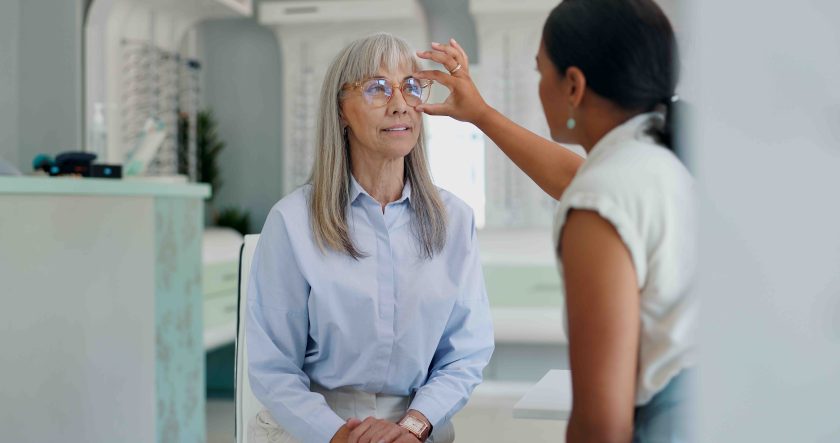
When is it time to consider cataract surgery?
If you’ve been told you have cataracts, you might be wondering, do I need surgery right away, or can I wait?
It’s a very common question and the answer isn’t always straightforward.
Cataracts develop slowly over time, and while surgery is the only effective treatment, the timing of that surgery depends on your individual needs, lifestyle, and symptoms.
In this blog we will discuss what cataracts are, how they affect your vision, and the signs that might mean it’s time to think seriously about surgery.
What are cataracts?
A cataract is a clouding of the eye’s natural lens. Think of the lens as a window that helps focus light onto the retina, giving you clear, sharp images. With age (and sometimes other factors like diabetes, smoking, or prolonged sun exposure), this lens gradually becomes cloudy.
In the early stages, cataracts may cause only minor changes in your vision, like needing more light to read or noticing more glare at night. Over time, however, the cloudiness progresses, making vision blurrier and everyday activities harder. When cataracts impact quality of life it’s time to think about surgery.
When do cataracts need surgery?
Cataracts don’t always require immediate treatment. In fact, many people live with mild cataracts for years without needing surgery. The key factor isn’t just whether you have cataracts, but whether they are interfering with your life.
Here are some signs that it may be the right time to consider cataract surgery:
- Blurry or hazy vision that makes it difficult to see clearly, even with updated glasses.
- Increased glare or halos around lights, especially when driving at night.
- Difficulty with everyday tasks, like reading, cooking, recognising faces, or watching TV.
- Frequent prescription changes in your glasses or contact lenses without real improvement.
- Safety concerns, such as struggling to drive safely or navigate steps and curbs.
If cataracts are holding you back from doing the things you love or need to do, that’s often the biggest indicator that surgery may be appropriate.
Why not just live with the impacts of cataracts?
Cataract surgery is one of the most common and proven surgeries performed worldwide with excellent outcomes. There is no rush and waiting doesn’t make the surgery riskier in most cases, however, there are a couple of things to keep in mind:
- Very advanced (or “mature”) cataracts can sometimes make surgery more technically challenging.
- If cataracts are affecting your ability to drive safely, delaying treatment could put you and others at risk.
Your optometrist or eye doctor will monitor your cataracts regularly and let you know if waiting is still safe or if sooner surgery is advisable.
What happens during cataract surgery?
Cataract surgery is a quick, day surgery procedure. The cloudy lens is gently removed and replaced with a clear artificial lens, called an intraocular lens (IOL). This new lens restores clear vision, and in many cases, it can also reduce your dependence on glasses.
Most people notice a big improvement in their vision within days, and recovery is typically rapid and straightforward. It is unlikely that both eyes will be treated on the same day and depending on your doctor, and if you are having the surgery privately or publicly, they may wait anywhere between 1 day to many months between each eye.
The right time
The right time to consider cataract surgery isn’t the moment you’re diagnosed, it’s when your cataracts start interfering with your quality of life. If you’re struggling with blurry vision, glare, or difficulty with everyday activities, it might be time to discuss surgery with your eye doctor.
Seek a referral to our care
Hunter Street Eye Specialists has a number of highly experienced cataract specialists available for consulting and access to a comprehensive suite of cataract technology and diagnostic equipment for its patient community.
The first step if to seek a referral from your optometrist to our care and then to contact a member of our friendly team on 02 9635 0663 or by filling out the contact form here to book in for an appointment.
Quick FAQs
Can cataracts come back after surgery?
No, the cloudy lens is permanently removed. However, some people may develop a cloudy film on the lens capsule behind the implant (called posterior capsule opacification). This isn’t a cataract returning, and it can be quickly treated with a simple laser procedure.
How proven is cataract surgery?
It’s one of the most common surgeries worldwide, with a high success rate and low risk of complications. Your surgeon will discuss any risks specific to your health and eyes.
Do I have to wait until my cataracts are advanced?
That’s an old idea. Today, cataract surgery is recommended based on how much the cataracts affect your daily life not whether they’ve reached a certain stage.
Will I still need glasses afterward?
That depends on the type of intraocular lens you choose.




